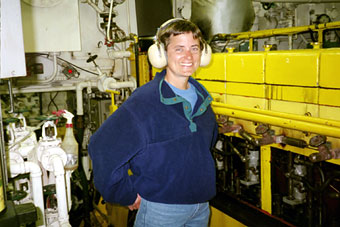

 | |||||||
|
|
Journals 2005/2006Maureen Barrett
August 30, 2005 Same deal as yesterday with the weather...high winds and rough seas, and the same deal with the cetaceans...short-beaked common dolphins riding the bow. Again, it was such a joy to watch them play! There are always some factors that limit or restrict scientific operations, and rough seas while doing a cetacean study is definitely one of them. When the Beaufort Scale is 5 or greater, it is too difficult to search for marine mammals. We had swells up to ten feet, and whitecaps as far as we could see. I learned that a few extra days have been built into the CSCAPE legs for days like this; days where it is impossible for the mammal observers to be on effort. It sounds similar to what schools are thinking when they add snow days to the calendar. Even though the scientists get a day off, the crew must continue to work. According to the Chief Marine Engineer Howard Boswell, the ship and crew provide all of the services of a small city. With no whales to watch today, I took a tour of the engine room. Five men keep the David Starr Jordan's engines running smoothly while providing us with necessities such as electricity, air conditioning, refrigeration, and water. What I found most interesting was where all of our fresh water comes from. We have thirty people on board, all drinking water, taking showers, and doing laundry, not to mention the water the cooks are using to prepare our meals. That is a tremendous amount of water needed on a daily basis. Howard explained that we are using the sea water that surrounds us. The ship draws in the ocean water, distills it, passes it though a filtration system, and then it is ready for us to use. So living on the Jordan is like living in a small city, and Howard and his men provide us with many of the things we need to survive.
Besides water, what is another common need of all living things? Food, of course. Lito Llena, the Chief Steward, and Mike Sapien, the Second Cook, take care of this in the galley. The meals being offered on the Jordan have been great. Three meals a day are served on the mess deck, and there is always plenty to eat in between meals. Lito plans the meals for the entire leg, and restocks for each leg while in port. On days like today when the seas are rough, the cooks have to adjust the menu because it can be dangerous boiling water or cooking oil while being tossed around by the sea! Mike said part of his job as a cook is being a "morale booster." He and Lito accomplish this by providing good meals, friendly conversation, and great desserts like chocolate cake! Daily maintenance of the ship is done under the direction of Chico Gomez. Chico has been on board the Jordan for 22 years. As the Chief Boatswain, he and his crew are responsible for the safety and maintenance of the decks and deck machinery and for the small boat operations. His men also do a daily shift on the bridge with the officers. As "watch standers," they look for navigational hazards in the water and conduct security rounds once an hour. It is obvious these guys love being at sea, especially when it is time to launch the small boat and chase whales! |
||||||
